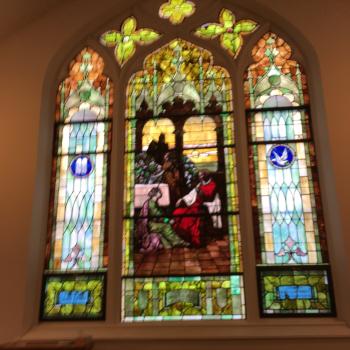I have been reading Henri de Lubac lately, the person some see as the greatest theologian of the 20th century. Specifically, I’ve been ploughing through his Catholicism tome. What strikes me most about de Lubac’s writing is his emphasis on unity and catholicity. It pervades everything he writes from doctrine to liturgy to sacraments. This sounds obvious, almost redundant, and yet de Lubac makes it sound fresh and new. Especially when we go back to the Church fathers (de Lubac’s speciality), it becomes increasingly obvious that the unity of the human race lay at the very heart of their theology. This can really strike a chord in our modern age, when both individualism and nationalism reign supreme.
De Lubac states his core thesis at the very beginning of his book, in the first paragraph of the first chapter, without beating around the bush: “the unity of the Mystical Body of Christ, a supernatural unity, supposes a previous natural unity, the unity of the human race“. Since man is made in the image and likeness of God, that image does not differ from individual to individual. It is the same image. As de Lubac puts it, “the same mysterious participation in God which causes the soul to exist effects at one and the same time the unity of spirits among themselves.” We are so entirely one that “we ought not to speak on man in the plural any more than we speak of three Gods.”
We need to examine the core Christian concepts of sin and redemption through this prism. Again, de Lubac is very clear: “all infidelity to the divine image that man bears in him, every breach with God, is at the same time a disruption of human unity. It cannot eliminate the natural unity of the human race– the image of God, tarnished though it may be, is indestructible– but it ruins that spiritual unity, which, according the the Creator’s plan, should be so much the closer in proportion as the supernatural union of man with God is the more completely affected.” In this vein, the Church fathers saw original sin as a separation, a sundering, an “individualization”. Redemption is therefore a work of restoration geared toward “the recovery of lost unity– the recovery of supernatural unity of man with God, but equally of the unity of men among themselves.”
In the great tradition of the complementarity of faith and reason, with the notion that “truth cannot contradict truth”, our fundamental unity is now increasingly stressed by biologists. In recent years, science—focused on the biological determinants of human behavior—is coming to an ever greater realization that we are really the same, and that differences based on skin color are utterly superficial and trivial. Biologically, we are one people. What makes us look different is no more than tiny and insignificant genetic effects. From this perspective, the concept of “race” is socially constructed and biologically meaningless. As a species, we are new, we are young, we are distinct, and we are one. This is in full accord with revealed truth.
As Catholics, this perspective is profoundly important. It is so obvious and so familiar that we often overlook its implications, for these implications are both radical and compelling. We are divided because of sin. Anything that applauds and boosts our division is in fact embracing sin and rejecting the redemption of Christ. And yet people, including Catholics, routinely talk up the divisions between people based on race, language, culture, geography etc. Instead of recognizing the barriers between us as evidence of a fallen world, they are more than happy to build walls. In Africa, the tribal identity routinely takes precedence over a common humanity, often with tragic consequences. In the west, we have falsely built up the nation state as the object of a person’s loyalty and love, even though the nation state is a relatively modern invention in socio-political organization. Too often, stressing the importance of loyalty to one’s people– a certain birthright, race, geographical region, culture– means downplaying the natural unity of the human race that underpins the Catholic faith. As a pertinent example, just consider the rhetoric in the current immigration debate in the United States, where our fellow Catholics are demonized as the “other” that should be kept out with walls and guns.
Division is, of course, inevitable. There will always be socio-political boundaries, lines in the sand as it were, and to think that these divisions will simply wither away is wishful thinking, and dangerous wishful thinking at that. But we must not embrace as natural something that is merely the result of sin. It reminds me of the mistaken approach many take to war. War is always a sign of failure. The Church teaches that war is only just as a last resort, which by definition means that everything else failed. That is nothing to celebrate here. War might be a permanent sign of the human condition, but it is a result of sin, the ultimate implication of the sin of disunity. The same is true of borders and boundaries. Such things are part and parcel of a broken world, but we should not look upon them as good. We should instead see them as tragic reminders of sin in the world. We should not glorify and idolize emblems of disunity. In that regard, the American civic religion which attempts to fuse Christianity with loyalty to the American nation is deeply heretical and antithetical to the true faith. Christians should strive to break down barriers, and take a deeply suspicious approach to the outlandish demands for loyalty by those perniciously stubborn relics of the eighteenth century– nation states.












